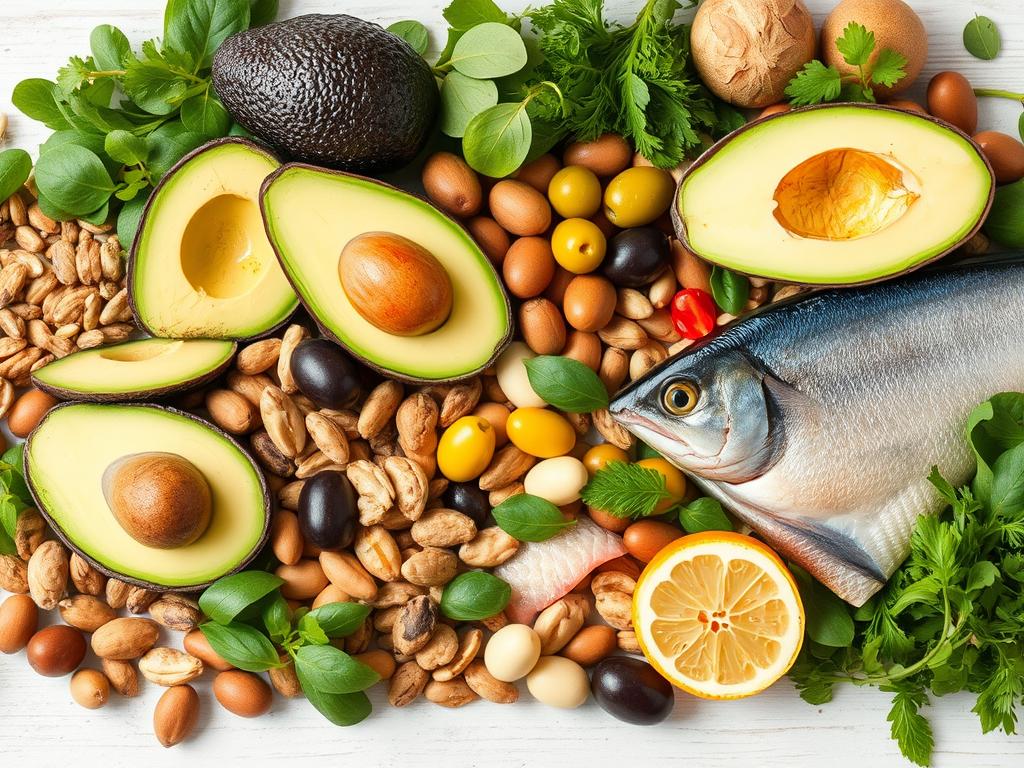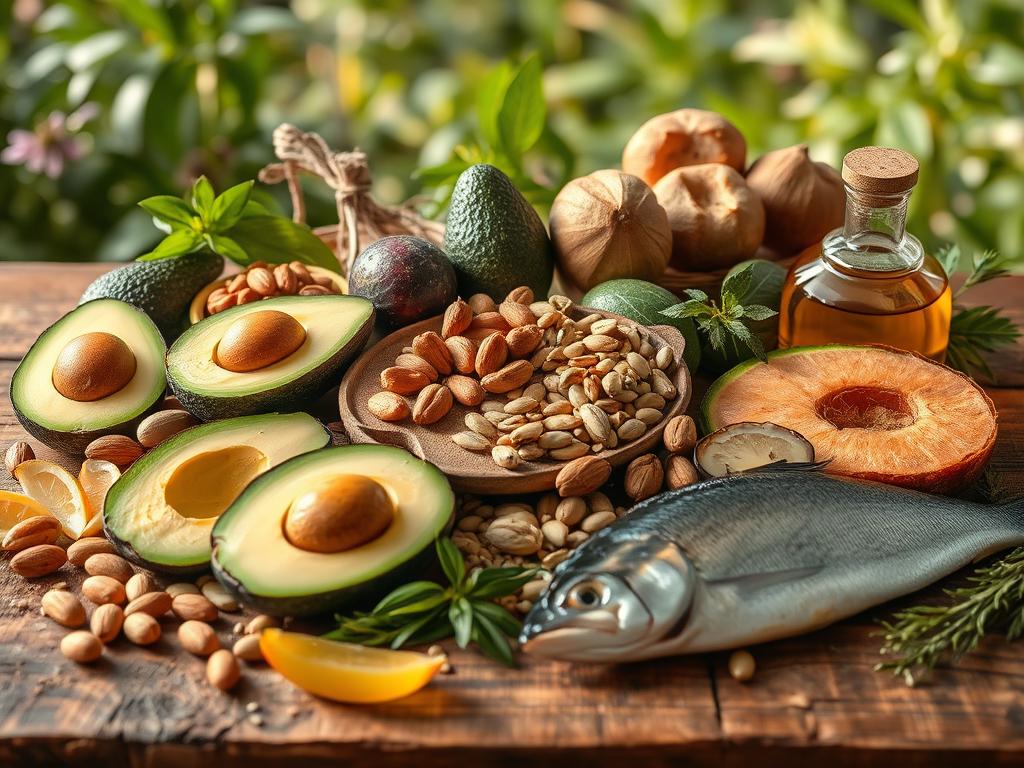Did you know that the American Heart Association recommends consuming at least two servings of fatty fish per week to support heart health?
Yet, many individuals avoid fats entirely, mistakenly believing that they are detrimental to their health. In reality, the right fats are essential for your body and play crucial roles in nutrient absorption, hormone production, and even brain function.
Understanding the importance of these fats and incorporating them into your diet can lead to significant health benefits, including enhanced cardiovascular health and improved cognitive abilities.
This article will delve into various types of beneficial fats, their distinct advantages, and practical ways to integrate these essential nutrients into your meals. You’ll find clarity on common misconceptions surrounding dietary fats, empowering you to make informed nutritional choices.
Key Takeaways
- Healthy fats are crucial for nutrient absorption and hormone production.
- A minimum of two servings of fatty fish per week is recommended.
- Replacing unhealthy fats with monounsaturated and polyunsaturated fats supports heart health.
- Reading food labels can help identify hidden trans fats in products.
- Incorporating healthy fats can improve brain function and cholesterol levels.
What Are Healthy Fat and Why Are They Important?
Healthy fats are essential components of a balanced diet, providing numerous benefits for overall health. These fats facilitate a wide range of bodily functions and contribute to overall well-being. Understanding their importance can help individuals make informed dietary choices.
The Role of Fats in the Body
Fats serve several crucial roles in our bodies. They act as a source of energy, support cell growth, and play a vital role in the absorption of fat-soluble vitamins A, D, E, and K. Healthy fats also contribute to hormone production and help regulate inflammation, which can impact various bodily functions. Eating the right types of fats can enhance overall health and improve nutrient absorption.
Types of Healthy Fat
There are two primary categories of fats: monounsaturated and polyunsaturated fats. Essential fatty acids, including omega-3 and omega-6, fall under polyunsaturated fats. These nutrients are important for brain function, skin and hair growth, bone health, and metabolism. Foods rich in these fats, such as avocados, olives, fatty fish, walnuts, and flax seeds, can help lower cholesterol levels and reduce the risk of heart disease. A balanced intake of these fats, suggested by health experts to account for 20 to 30% of daily calories, can support cardiovascular health.
Common Misconceptions About Dietary Fats
Throughout the years, dietary fats have often been misunderstood. Many individuals historically viewed fats negatively, leading to unnecessary avoidance of healthy sources. Recent research challenges this notion, demonstrating that fats found in whole foods can be beneficial. Reducing unhealthy fats, particularly trans fats and excess saturated fats, remains a priority for health. Embracing foods containing good fats and recognizing their advantages can positively impact heart health and overall nutrition.

Health Benefits of Healthy Fat
Incorporating healthy fats into your diet comes with numerous advantages that significantly impact overall well-being. Recognizing their benefits can empower individuals to make informed dietary choices that support heart health, cognitive health, and weight management.
Heart Health and Cholesterol
Healthy fats, particularly unsaturated fats, play an essential role in maintaining heart health. Research indicates that they can lower bad cholesterol (LDL) while increasing good cholesterol (HDL). The American Heart Association suggests that polyunsaturated fats should account for 8-10 percent of daily calorie intake, as they can help manage blood pressure and cholesterol levels effectively. Regular consumption of omega-3 fatty acids found in seafood at least once a week has proven beneficial in reducing the risk of heart disease. By replacing saturated fats with healthier unsaturated options, individuals can enhance their cardiovascular wellness.
Brain Function and Cognitive Health
Healthy fats also support critical aspects of cognitive health. Omega-3 fatty acids contribute to improved memory and cognitive function. Regularly consuming fatty fish provides essential nutrients necessary for brain health. Studies suggest that eating seafood twice a week can help prevent age-related cognitive decline. With growing evidence linking these fats to enhanced brain function, it’s clear that these nutrients are vital for maintaining memory and learning capabilities throughout life.
Weight Management and Satiety
Another significant advantage of healthy fats lies in their ability to assist with weight management. Foods rich in these fats, such as avocados and nuts, promote feelings of fullness, aiding in appetite control. They help reduce overall hunger, making it easier to maintain balanced portion sizes during meals. Emphasizing the benefits of healthy fats can lead to better satisfaction and effective strategies for managing weight without sacrificing flavor or nutrition.
Incorporating these fats into daily meals not only enhances flavor but also bolsters overall health benefits. For those interested in exploring the health-boosting properties of various nuts, a deeper understanding can be found in this guide on nuts and their amazing health.
Best Food Sources of Healthy Fat
Incorporating healthy fats into your diet provides essential nutrients and boosts overall health. Several delicious foods serve as excellent sources of these fats. They not only support heart health but also contribute to brain function and overall well-being. Here, we explore some of the fat-rich foods that stand out for their rich profiles of beneficial fats.
Avocados and Nuts
Avocados are a powerhouse of healthy fats, containing about 14.7 grams of fat per 100 grams. This fruit is predominantly made up of monounsaturated oleic acid, which is great for heart health. Nuts, including almonds and walnuts, also make a perfect choice. A 1-ounce serving typically includes:
- Almonds: 14.1 grams of fat
- Walnuts: 18.5 grams of fat
- Brazil nuts: 19 grams of fat
Consuming a small handful of nuts daily has been linked to numerous health benefits, including improved cholesterol levels and reduced risk of heart disease.
Olive Oil and Fatty Fish
Extra virgin olive oil stands out as one of the Best Fats to Eat, rich in monounsaturated fats and vitamin E. It contains approximately 14 grams of fat per tablespoon. Pair that with fatty fish like salmon or mackerel, which are loaded with omega-3 fatty acids. A typical 3-ounce serving of fresh mackerel contains around 11.8 grams of fat and 15.8 grams of protein. The American Heart Association recommends consuming two servings of fatty fish weekly to reap the full health benefits.
Seeds and Dark Chocolate
Various seeds, especially chia seeds, offer a remarkable source of healthy fats. A 1-ounce serving of chia seeds delivers about 8.7 grams of fat, primarily polyunsaturated. Dark chocolate is another indulgent Healthy Fat Food. One ounce of dark chocolate contains approximately 12.1 grams of fat, with about 6.95 grams of saturated fat. Although delicious, it should be consumed in moderation due to its sugar content.

| Food | Serving Size | Fat Content (grams) |
|---|---|---|
| Avocados | 100 grams | 14.7 |
| Almonds | 1 ounce | 14.1 |
| Walnuts | 1 ounce | 18.5 |
| Extra Virgin Olive Oil | 1 tablespoon | 14 |
| Fresh Mackerel | 3 ounces | 11.8 |
| Chia Seeds | 1 ounce | 8.7 |
| Dark Chocolate (70% cocoa or higher) | 1 ounce | 12.1 |
How to Incorporate Healthy Fat into Your Diet
Incorporating healthy fats into your daily meals can significantly enhance your overall health. Understanding how to include cooking with these fats in your diet can create tasty and nutritious options. Consider various cooking techniques, clever snacking ideas, and inventive meal suggestions that utilize fat-rich foods effectively.
Cooking Tips for Using Healthy Fat
When cooking, opt for olive oil as a primary fat. Its robust flavor works well in dressings and as a cooking oil. You can even substitute some oil with ingredients like applesauce to reduce calories without sacrificing taste. Remember, moderation is paramount; a little healthy fat goes a long way in enhancing flavors without overwhelming your dishes.
Snacking with Healthy Fat
Snacking smartly ensures you’re fueling your body with nutritious elements. Options like a handful of mixed nuts, guacamole paired with fresh veggies, or yogurt with a sprinkle of flaxseed provide excellent sources of healthy fats. These snacks not only offer healthful fats but also help keep hunger at bay.
Meal Ideas for Adding Healthy Fat
To integrate healthy fats into your meals, consider the following Meal Ideas:
- Add slices of avocado to your salads for a creamy texture.
- Use olive oil in your stir-fry dishes to elevate the taste and health benefits.
- Include fatty fish like salmon or mackerel in your weekly meal prep for an excellent source of omega-3 fatty acids.
- Incorporate whole eggs into your breakfast for added protein and nutrients.
Creating homemade crispy crackers can also be an excellent addition to your snacking repertoire. These can be prepared using recipes that focus on healthy fats, ensuring they remain low in saturated fats while rich in flavor. Discover how to make your own crackers here.

Healthy Fats vs. Unhealthy Fats
Understanding the difference between healthy and unhealthy fats is essential for making informed dietary choices. Unhealthy fats, including trans fats and excessive saturated fats, can negatively impact heart health, while the right fats provide vital benefits. Efforts to learn more about Making Better Fat Choices can significantly improve overall wellness.
Identifying Unhealthy Fats
Unhealthy fats are primarily found in processed foods, fried items, and fatty meats. These include:
- Trans fats, often present in baked goods and snacks.
- High levels of saturated fats from red meats and full-fat dairy.
- Processed meats, which have been associated with an increased risk of heart disease.
Being aware of these unhealthy fats can help individuals make better choices for their health.
Impact on Health – A Comparison
Health consequences vary significantly between healthy vs. unhealthy fats. The good fats, such as those in avocados, nuts, and fish, support heart and cognitive health by reducing bad cholesterol. In contrast, unhealthy fats can lead to obesity, increased risks of heart disease, and other chronic conditions. Studies indicate that high intake of processed meats correlates with a 20% increase in heart disease risk.
Making Better Fat Choices
To promote health, focus on selecting foods rich in healthy fats, such as:
- Olive oil
- Nuts and seeds
- Fatty fish rich in omega-3 fatty acids
Reading food labels aids in recognizing fat content, helping to prioritize healthier options. For further insights into nutrient benefits, explore vitamin E and its role as an. Making conscious dietary changes can lead to a healthier lifestyle.
Conclusion: Embracing Healthy Fats for Better Health
In summary, the importance of healthy fats in our diet cannot be overstated. They play a crucial role in maintaining heart health, enhancing cognitive function, and aiding in weight management. Understanding the distinction between healthy fats, like those found in avocados and nuts, and unhealthy fats, such as trans fats, is essential for making informed dietary choices. As research continues to evolve, there is mounting evidence supporting a reduction in saturated fat’s perceived risks, indicating that individuals can choose healthier fats without fear.
Summary of Key Points
Transitioning to a diet that includes a variety of healthy fats can lead to significant health improvements. As noted in studies, integrating fatty fish and unsaturated fats into meals not only boosts heart health but also supports weight management by regulating metabolism and enhancing satiety. The Mediterranean diet is an excellent example of this approach, providing numerous benefits while emphasizing the importance of dietary balance.
Encouragement to Make Changes
Consider making small, practical changes today to incorporate more healthy fats into your meals. Aim for a few servings daily and explore nutritious options such as avocados, nuts, and olive oil that can enrich your diet. These adjustments may lead to noticeable improvements in your overall well-being over time.
Future Implications for Dietary Choices
As we gain a better understanding of nutrition, it’s clear that embracing healthy fats holds great promise for addressing common health issues like obesity and heart disease. Continued education regarding the importance of these fats will empower individuals to make more informed dietary choices that promote long-term wellness. In this evolving landscape of health and nutrition, focusing on inclusive approaches to dietary fats will foster a more balanced, health-conscious society.











